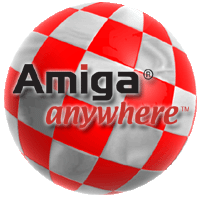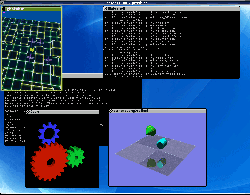
Amiga DE

| Developer |
TAO Group
& Amiga Inc. |
| Host OS |
Red Hat 6.1: June 3rd 2000 (SDK)
Windows: August/September 2000 (SDK) |
| CPU |
x86, PPC, MIPS, ARM, SH4 and some processors that haven't been
announced yet. |
| Release |
Developer System: May/June
2000 |
Amiga DE is an updated version of Tao Group's Elate operating
system. As part of the agreement, Tao Group provided the embedded
OS, while Amiga Inc. develop the 'Usability Layer', drivers, and
codecs required for a consumer market. Over time Amiga Inc. will
gradually implement larger portions of their code to customize it
for the specific market. Through a series of developer releases
(Amiga SDK), Amiga Inc. have provided an
early idea of the capabilities of the operating environment. The
company have also released several game packs for non-developers,
including the Party Pack,
Amiga DE Player and the
Entertainment Pack #1.

At the moment a large portion of the Amiga DE is protected by
NDA (Non Disclosure Agreement), which prevents anyone discussing
the final feature list. It is known that Amiga Anywhere will
feature extensive 2D (Ami2D) and 3D (Ami3D) support, as well as a
built-in Java virtual machine.
Amiga... Anywhere?
As the name suggests, Amiga Anywhere will be marketed as a
cross-platform solution, providing the ability to execute
applications on any hosted environment. The table below shows a
selection of the platforms that Amiga Inc. have indicated will
be/are supported:
| Desktop |
Windows |
| AmigaOS 4.2 |
| Linux |
| QNX |
| Portable |
Windows CE / Pocket PC 2002 |
| ZaurusOS |
| EpocOS |
| iTron |
The great name change
Over the past two years, Amiga Anywhere has been through several
name changes. The table below shows its previous titles, the time
period and the reason for the change.
| Name |
Date |
Reason for change |
| AQUA |
January 2000 |
Apple trademarked the name for MacOS X |
| AMIE (AMIga Elate) |
March 2000 - Mid 2000 |
Unknown |
| Amiga DE (Digital Environment) |
Late 2000 - Present |
The complete development environment |
| Amiga Anywhere |
April 2002 - Present |
A subset of the complete AmigaDE focused upon specific
content. |
The distinction between the Amiga DE & Amiga Anywhere is
particularly confusing. In a June
2002 Executive Update, Bill McEwen indicated the Amiga DE was
the full development environment that would be used for
development, while the Amiga Anywhere Content Engine refers to the
platform specific engines that run on top of the various
hardware.
Market
In early 2000, Fleecy Moss indicated that Amiga DE was aimed at
two markets. Although a great deal has changed since that time, it
remains an accurate description of Amiga Inc's intent.
Domestic Digital Habitat
An unusual name for a common concept. DDH describes the convergence
market as a whole, developing for palmtops, mobile phones, and
set-top boxes. Technology for Technophobes.
Pathfinder
Describes the general desktop users' who will use the Amiga DE.
Several options are available, allowing the user to run the OE as a
hosted environment (on AmigaOS, Windows, Linux, etc.), as a library
(or .DLL) that is executed when a game is executed, or as a
standalone operating system. AmigaOS 4.2+ will contain a 'Amiga DE'
layer, allowing the operating system to take advantage of
multi-platform applications.
View Elate Screenshot (87k)
BACK |













